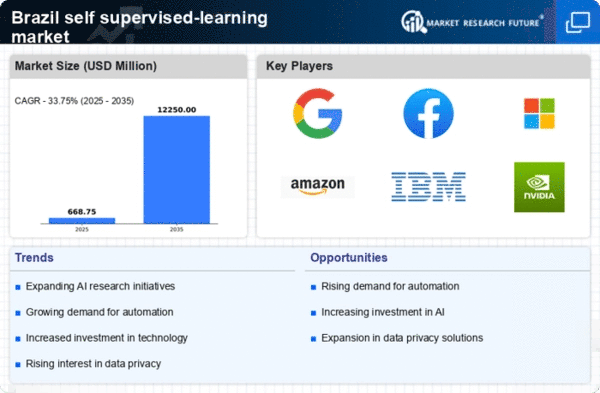Emergence of Innovative Startups
The self supervised-learning market is witnessing a proliferation of innovative startups in Brazil, which are contributing to the dynamism of the industry. These startups are focusing on developing cutting-edge self supervised-learning technologies that address specific market needs. In 2025, it is estimated that the number of AI startups in Brazil could exceed 1,000, with many specializing in self supervised-learning applications. This influx of new players is likely to foster competition and drive advancements in the market, as startups introduce novel solutions that challenge established companies. The self supervised-learning market is expected to benefit from this competitive landscape, leading to enhanced product offerings and increased accessibility for businesses seeking to implement AI-driven solutions.
Increased Investment in AI Research
The self supervised-learning market in Brazil is experiencing a surge in investment from both public and private sectors. This influx of capital is primarily directed towards research and development initiatives aimed at enhancing AI capabilities. In 2025, it is estimated that investments in AI research could reach approximately $1.5 billion, reflecting a growth of around 25% from previous years. This financial commitment is likely to foster innovation in self supervised-learning technologies, enabling Brazilian companies to develop more sophisticated algorithms and models. As a result, the self supervised-learning market is poised to benefit from improved performance and efficiency in data processing, which could lead to broader applications across various sectors, including healthcare, finance, and manufacturing.
Expansion of Cloud Computing Services
The self supervised-learning market in Brazil is benefiting from the rapid expansion of cloud computing services. As businesses increasingly migrate to cloud-based platforms, the demand for scalable and efficient self supervised-learning solutions is on the rise. In 2025, the cloud computing market in Brazil is projected to grow by 35%, creating a favorable environment for the self supervised-learning market. This growth is driven by the need for flexible data storage and processing capabilities, which are essential for training self supervised-learning models. Consequently, companies are likely to invest in cloud-based self supervised-learning tools that can handle large datasets and provide real-time analytics, thereby enhancing decision-making processes across various sectors.
Growing Demand for Automation Solutions
The self supervised-learning market is witnessing a notable increase in demand for automation solutions across various industries in Brazil. Companies are increasingly recognizing the potential of self supervised-learning to automate complex tasks, thereby enhancing operational efficiency. In 2025, the automation market in Brazil is projected to grow by 30%, with self supervised-learning playing a crucial role in this transformation. This trend is particularly evident in sectors such as logistics and customer service, where automated systems powered by self supervised-learning algorithms can significantly reduce costs and improve service delivery. Consequently, the self supervised-learning market is likely to expand as businesses seek to leverage these technologies to remain competitive in an evolving economic landscape.
Rising Need for Data Privacy and Security
As the self supervised-learning market continues to evolve in Brazil, there is an increasing emphasis on data privacy and security. With the implementation of stringent regulations, such as the General Data Protection Law (LGPD), companies are compelled to adopt self supervised-learning solutions that prioritize data protection. This regulatory environment is expected to drive the market, as organizations seek to ensure compliance while harnessing the power of AI. In 2025, it is anticipated that the demand for secure self supervised-learning applications will rise by 40%, reflecting a growing awareness of the importance of safeguarding sensitive information. Thus, the self supervised-learning market is likely to adapt by developing more robust frameworks that align with legal requirements, ultimately fostering consumer trust.
















